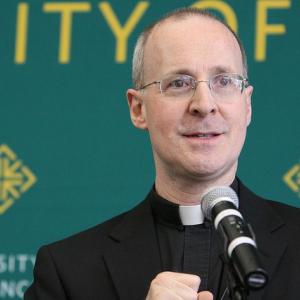
Charles C. Camosy is a professor of theological and social ethics at Fordham University and author of For Love of Animals: Christian Ethics, Consistent Action. He is a member of the Faith Advisory Council of the Humane Society of the United States.
Posts By This Author
What the ‘Star Wars’ Franchise Can Learn from the Roman Catholic Church
What is Star Wars? For the first decade or so after George Lucas made what would come to be known as Episode IV, which celebrates its 40th anniversary this year, the answer to that question was easy: Star Wars was whatever Lucas said it was.
Fr. James Martin: ‘Advocating for LGBT People Is Necessary’

Image via Shawn/Flickr
The level of polarization is the worst I’ve ever seen in my 30 years as a Jesuit. And I think a lot of it has to do with the pushback, opposition, and downright contempt for my fellow Jesuit, Pope Francis. His emphasis on mercy, on accompaniment, on encounter and, especially, as in (his apostolic exhortation) “Amoris Laetitia,” on discernment, has driven some people into near hysterics.
How the Last Debate Added to Our Hopelessly Incoherent Discourse on Abortion
For the first time in three general election debates, a moderator asked the presidential candidates on Oct. 19 about abortion.
Given that abortion has rightly been described as the source of America’s second civil war, there has been a baffling lack of engagement with it this election cycle.
You Are Not Your Brain: What a 'Head Transplant' Would Really Mean
It has already been successful in other animals: Physicians have severed the spinal cords of one white mouse and one black mouse, switched their heads and produced living mice. Similar surgeries have been successful with dogs and monkeys.
And now there is serious talk of doing a head transplant on a human being.
Why Should We Care About Animals Amidst So Much Human Suffering?
It turns out that protecting nonhuman animals also protects human animals.

Ulrich Mueller / Shutterstock
AT THE HEIGHT of the culture wars in the 1980s, Cardinal Joseph Bernardin of Chicago gave a lecture at Fordham University on something he called “the consistent ethic of life.” Fortunately for those of us captured by this vision, a New York Times reporter happened to be in the audience. The next day’s headline read: “Bernardin Asks Catholics to Fight Both Nuclear Arms and Abortion.”
It got a lot of people talking. Then, as now, it was an incredibly countercultural message that disrupted the liberal/conservative binary of secular political imagination. But Bernardin’s views, though novel in a U.S. context, were articulating the principles of an ancient faith: consistent nonviolent protection and support for life in every circumstance. Within the politics of U.S. culture wars, this means refusing to make distinctions between a child dying of a treatable disease and a child killed by abortion. Instead, we insist that Christ is always with the least among us and that we must let these little children come to him. Every last one.
The most famous animal-lover
As a Catholic professor of ethics, I’ve spent most of my career thinking about what this consistent protection of life means for bioethics. As a result of my research, I’ve come to believe that the “bio” in bioethics must include how we treat the lives of animals. Or as I prefer to say: how we human animals should protect and care for nonhuman animals. After all, humans are animals too.
I’m not the only one who’s arrived at this conclusion: In his 2015 encyclical, Laudato Si’, Pope Francis appealed to a consistent life ethic to underline the urgency of addressing the global climate crisis, which threatens the lives of so many. As you might expect from a pope who named himself after the most famous animal-lover in the church, Pope Francis explicitly included nonhuman animals as intrinsically valuable parts of God’s creation in need of protection and care. “It is not enough,” he says, “to think of different species merely as potential ‘resources’ to be exploited, while overlooking the fact that they have value in themselves.” Several chapters later, Pope Francis calls on Christians to “forcefully reject the notion that our being created in God’s image and given dominion over the earth justifies absolute domination over other creatures.”
The Human Toll of Drone Warfare

Image via REUTERS/Lucas Jackson/RNS
President George W. Bush let innumerable attacks on his decisions, intelligence, and character roll off his back while he was in office. But facing the families of soldiers killed in Iraq and Afghanistan took a heavy emotional toll on his presidency.
Bush wrote more than 4,000 letters to these families. He also met with many of them, behind closed doors and away from cameras and reporters. The dramatic scenes, according to first lady Laura Bush, were “incredibly emotional.”
‘Star Wars’: Return of the Transcendent
“Daddy, he’s real.”
She had seen computer-generated Yoda from the prequels, but upon seeing the actual puppet in Empire Strikes Back, Simon Pegg’s daughter couldn’t contain her wonder. When Pegg (who has a cameo in the new film) related this story to J.J. Abrams, the director of The Force Awakens used it to convince Disney of his plan to build a huge number of real sets, puppets and costumes.
Indeed, Abrams now introduces Pegg as “the guy whose daughter saved Star Wars.”
And saved it is. In addition to record-breaking ticket sales, the film has received overwhelmingly positive reviews. Abrams has put us back in the reality of Star Wars, a familiar world in which people actually live.
On Pornography, U.S. Catholic Bishops May Find an Unlikely Ally

Image via Brian A Jackson / Shutterstock.com
Naming it “corrosive” and a “dark” sign of contemporary American culture, the U.S. Catholic bishops approved a document this week condemning the production and use of pornography as a mortal sin.
Reaction from the bishops’ critics didn’t take long. Some said the bishops themselves have very serious problems with pornography; others pointed out the not-so-distant sex abuse crisis. The upshot was that the bishops ought to have different priorities.
One could be forgiven for confusing this disagreement with one from the 1980s. Didn’t it play out over a generation ago — with the result that our culture basically accepts porn as part of sexual liberation?



